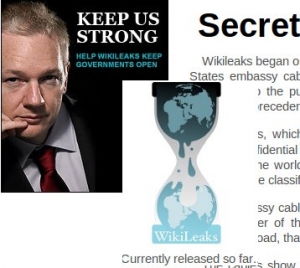Cyber War: Big Brother Lashing Out
 (published at Chowk)
(published at Chowk)
While secrecy is a necessity of operational statecraft, it should never be a weapon of duplicity in policy.
Google News Search has thousands of stories on Wikileaks, but nothing making the front page. The hashtag #imwikileaks is red-hot, but not trending as it should. Ground-breaking stories are not making it to the news in some countries. The rich and powerful have never be challenged in this way before, and the same rich and powerful are reacting in the same emotional, knee-jerk and desperate behaviour that they so despise in poorer and weaker beings.
The United States and France are pressuring hosting providers and payment providers to stop providing services to Wikileaks, while Britain and Switzerland are turning a blind eye. Meanwhile, a Pakistani judge, Azmat Saeed, actually said ‘We must bear the truth, no matter how harmful it is’ when petitioned to block the site in Pakistan. Russia and China are smug in schadenfreude, while the Arabs are tight-lipped.
Just so that we don’t lose track, this is the same Wikileaks that uncovered the video of the helicopter attack on Reuters journalists in Iraq, leaked the Afghan war diaries, exposed the incestuous dealings between owners of the defunct Icelandic banks, the membership of the BNP in the UK, showed the world how Guantanamo prisoners were not being allowed to meet with the Red Cross, and now it is about to release the ‘civil disobedience’ of a major global bank in 2011. This is the same Wikileaks that is redacting sensitive names from the cables that it is releasing and the same Wikileaks that offered to consult the US government in removing information that the US considered ‘harmful.’ And while the American media focuses on Julian Assange, the FULL set of over 250,000 cables is already with mainstream media organisations — The Guardian, New York Times, Der Spiegel, El Pais and Le Monde. And while we are at it, let us understand that the cables were ‘leaked’ by a United States soldier, Bradley Manning.
Independent journalism is the sine qua non of democracy, and after the corporatisation of mainstream media, this turn of events was inevitable. Right before our eyes, the same technology that states rely on to deprive many of their freedom, make even more constantly afraid, and guide bombs to a few unlucky ones, is being used to give us information about those who rules us. While secrecy is a necessity of operational statecraft, it should never be a weapon of duplicity in policy. If democracy is worth anything other than a deception, the policies of those who the people authorise to rule over them should be crystal clear and above reproach: Prove to us that you are clean and we have no interest in the secrets of the details of how you implement them.
For politicians brought up in a tech-leveraged neo-conservative cocoon, the harsh reality is sinking in: “Slapping down the waves does not calm the water.” To progressives disillusioned with Obama, this is actually ‘change we can believe in’. The number of secret documents in the US went up 10-fold between 1996 and 2009: ‘when everything is classified, then nothing is classified’, said US Supreme Court Justice Potter in 1971. He continued, ‘The hallmark of a truly effective internal security system would be the maximum possible disclosure, recognizing that secrecy can best be preserved only when credibility is truly maintained.’
Paper copies of secret documents could be numbered, accounted for, and destroyed. With digital data, you just can’t do that. The only logical outcome of this incident would be for governments that do not want a repeat show to cut down on what they call secret. At this time, in the midst of the storm, many otherwise well-meaning governments and politicians re not thinking clearly. As Julian Assange told TIME, “The media scrutiny and the reaction from government are so tremendous that it actually eclipses our ability to understand it.” In its panic, governments have shown a glimpse of the power they have over cyberspace and it will not go unnoticed.
Human history has always been a struggle between the few who secretly try to usurp the power of the state, a power given to the state by the many in return for security. Often, the secret few win. Once in a while, the many weak may win when the conditions are just right and even then only with a fearless and stubborn protagonist. This is one of those times, and the only possible outcomes are an Orwellian big-brother state or a relaxing of secrecy and blooming of a representative global rule, and not a de-facto rule by secret cables.
